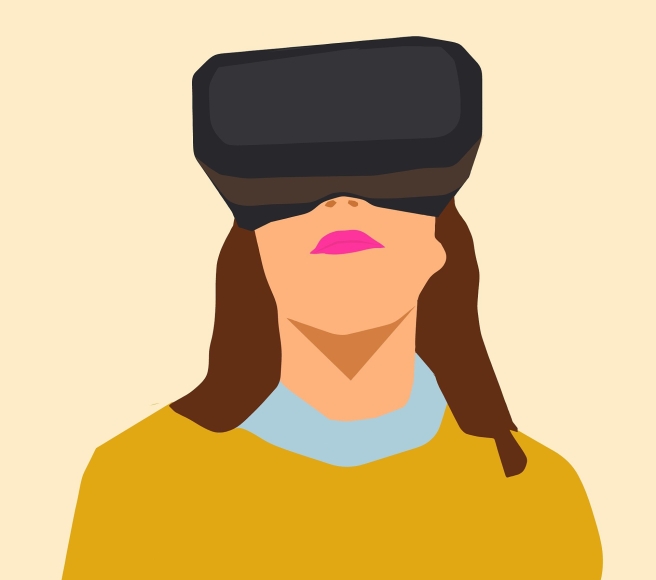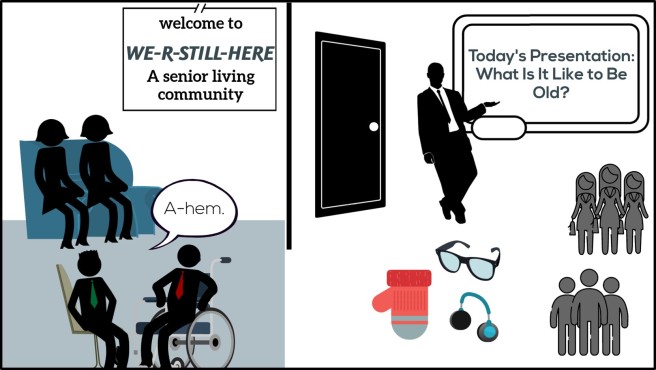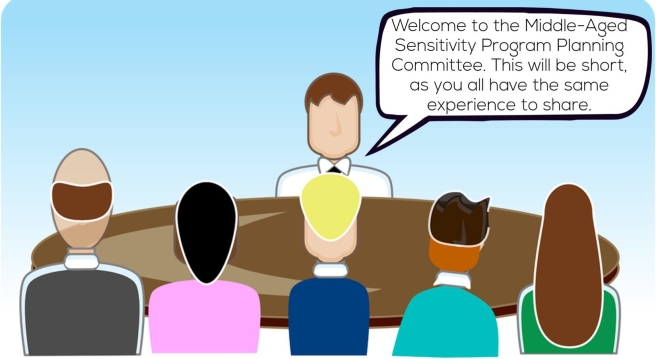For many years now we have had various forms of aging and dementia “sensitivity” programs. The intent of these programs has been to create awareness of the experience of aging and/or dementia, and perhaps, to foster empathy for challenges experienced by people who are growing older or growing with dementia. For aging, these programs have often included glasses smeared with Vaseline to demonstrate how an older person might see the world with glaucoma or macular degeneration. For people with dementia, it might be a simulation of sensory changes such as voices heard through headphones.

I believe these programs have been well-intentioned. And, perhaps, they have placed on the social radar the need to have awareness of the experience of aging and dementia. Yet, I would like to ask us to stretch our minds a little more.
A great blog by Ashton Applewhite in 2016 addressed these programs by asking, “What do they actually teach?” In the blog she and others pointed out concerns about these programs teaching stereotypes about aging, focused primarily on the negative, as well as neglecting the individual experiences of growing older and growing with dementia. Ashton expressed her concerns that, although these programs create awareness, and teach a story of aging, it is not necessarily a vision of aging that is accurate, universal, or even helpful. It could actually be damaging.
I agree. I would like to pick up this topic, from my own voice, and carry these concerns a step further, as well as offer some alternative possibilities.
I would add the concern that sensitivity programs can contribute to our feeling that older people or people with dementia are different than us – “those people”. It is “those people” who have these challenges like cataracts, macular degeneration, or cognitive changes, not us. Meanwhile, any one of us can and do have these challenges. It sort of feels like we are outside looking in, which doesn’t feel very sensitive. So, here is a question:
Doesn’t it strike you as strange that we need to create simulations of aging and dementia when we indeed have real people with dementia and people who are growing older who we can ask about their experiences?
I mean, do we NEED to simulate aging and dementia?

I have an alternative.
Let’s talk to people who are growing older and growing with dementia. Let’s see them. Ask them about their experiences. Have experiences with them.
I need to confess that I am saying all this as someone who created aging sensitivity programs, earlier in my career. That’s right. I had good intentions. I thought it would help people be interested in aging. Maybe it helped. But then I started thinking differently about it. And I feel that I have to share how this change of heart and mind happened. Because we always, always, always have to keep challenging ourselves to listen and do better. I am willing to share my journey – perhaps if we are more open with the lessons we have learned, we can all view change without judgment.
So, what has made me change my mind?
It has been the voices of the many people growing older and growing with dementia who have shared with me their experiences. People who live some of these difficulties we have in sensitivity programs, and people who don’t. People who have physical and cognitive challenges, and yet, that is not what they are all about. People who have surprised me with who they are. People who have given me different perspectives about what it means to them about growing older or living with dementia.
This made me realize that we cannot neatly explain the human experience of a group of people through a few characteristics that may or may not apply to all of them, and if it does apply, looks different for each person.
Think about it. If I were to gather together a group of my middle-aged friends, and then try to create a sensitivity program on what it was like to be middle-aged, what would that even look like?

It would be tough, as we are all individuals. And it would probably be offensive to be reduced to a few characteristics that seemingly attempt to describe MY experience.
Alright, let’s say we all start talking to people growing older and growing with dementia to try to understand their experiences, what they are all about, what is important to them, etc. Will this tell us what IT IS LIKE TO GROW OLD, as in, THE ANSWER about what aging or dementia is like?
No, because that’s the point. Each one of us is an individual, and the experience of growing older is unique to each of us, even if we share some challenges of growing older, like cataracts, or arthritis, or dementia. Or even if we share gifts of growing older or growing with dementia. These shared experiences might not look or feel the same for everyone.
Should we keep talking to each other? Yes.
Because this is what really fosters empathy – being curious about each other.

Sonya
While some of your points are valid re: dementia simulation, I suggest that it would be difficult to find someone who is living with moderate to advance stages of dementia (this is when most families and care providers report significant issues with providing appropriate care) to engage in a meaningful conversation whereby we might receive the same vital information that evidence-based research and clinical observation provide. I am not devaluing the contribution they might provide on SOME aspects of what they experience and I support the idea of including “these people” in as many conversations as possible. And to learn from mountains of INDIVIDUAL experiences.
I think we have to be very careful as some leaders and organizations paint a picture of dementia in the light of the active and healthy persons living with early-stage and, often, younger-onset dementia. We definitely receive great benefits and insights from these “real dementia experts”. However, this is NOT the accurate depiction of what most people LIVING with dementia looks like; nor is this the majority of people that we are entrusted to provide care for.
Thanks for being a compassionate REVISIONIST!
Dayne DuVall
Certified Alzheimer Educator
Virtual Dementia Tour Certified Trainer
Florida Certified Dementia Education & Training Provider
LikeLike
Hi Dayne! Thanks for your great comments. This is what is all about- putting this all out there so we can see different perspectives! I agree that we don’t want to dismiss the realities and challenges of dementia (or growing older) by only focusing on folks that are less challenged. It is a balance, because their experiences are real, and inspiring, and thought-provoking. To me, it is like seeing the 95-year old marathoners and assuming that is the experience of aging for all people, and that, if you are not running marathons, you are not aging successfully! Yet, wow, it is so important that we know there are 95-year old marathoners out there! Perhaps what we really need to consider is that people don’t know what they don’t know. So, if I go through a sensitivity program, and that is my only, or primary exposure to aging and dementia, I might then think that this is indeed what growing old is like, or what dementia is like. It’s so important that we have discussions about the experiences of growing older and growing with dementia. You make an excellent point about not perhaps being able to have a traditional conversation with a person with dementia who is more progressed- how can we know their experience? I think about this a lot. For me, people in the earlier experiences of dementia have taught me so much about what it might be like, and I have to believe that some of these things might not necessarily change as their disease progresses. For example, if it is frustrating to not be able to find the word in the beginning of the experience with dementia, certainly that frustration still is experienced, and increased throughout the journey. I suppose, to that point, how do any of us really know what it is like to have dementia that has progressed deeply? How can we even simulate it, because we really don’t know. From the “outside”, observing and being with different people with dementia, we might see one person with dementia who seems peaceful. Another person is in distress. We can’t necessarily say what is going on inside of them, how they are seeing the world. Such a tough balance and challenge – on one hand we want people who do not have dementia to have empathy – to try to understand the experience of dementia. On the other hand, “we” don’t really know, and what we do know might be individual, or just a part of the story, not the whole story. What is important is this awareness and conversation – this curiosity to know and understand. Thanks, Dayne! And I know I still owe you a drink 🙂
LikeLike
Oh SAGE ONE! I adore you and am so glad that you share your knowledge and experience so unselfishly! And, I hope we have another face-to-face soon AND with a drink in hand!
XXDD
LikeLiked by 1 person
You bet! Thanks again for chiming in! We are all revisionists.
LikeLike
A very wise woman earlier in my career once said to me ” Once you have met one person with dementia, you have met one person with dementia”. I still quote this wise person to this day. And it has taken me years to truly appreciate the depth of that statement. Aging is a universal and very unique experience at the same time. Experiencing cognitive challenges makes this statement even more true.
In all honesty, I cringe a little at the memory of those ” sensitivity kits”. Yes, we were all well intentioned, and I do believe some level of sympathy or empathy may have happened. More important was the conversation that hopefully followed. Thank you for keeping the conversation alive.
Happy New Year.
Patti
LikeLike
I, too, quote that wise woman! Individuality should be our guiding light, always. The post-experience conversation is the MOST IMPORTANT element of the experience. If it is all “shock and awe”, then all we have done is created more emotional distress. That should not be the intent. I believe more harm than good is done if “the [proper and well-informed] conversation” doesn’t take place.
Thanks for bringing up this very important observation!
Dayne
LikeLike